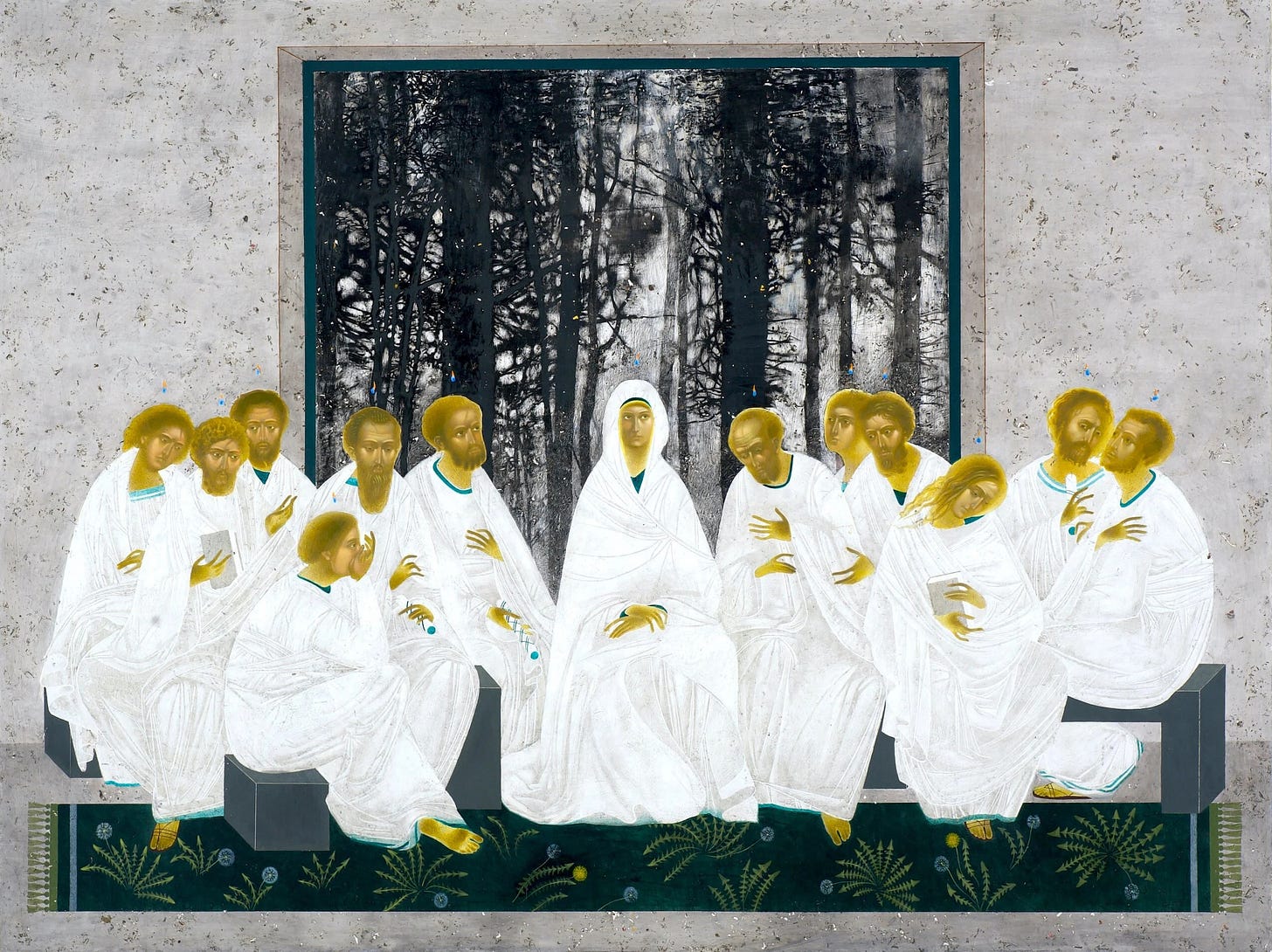Out of My Depths
Some fragmented thoughts on Psalm 130, songs and poems, a birth of hope amid the war in Ukraine, and gratitude amidst sorrow
Friday, March 3
Grand Rapids, Mich.
“Out of the depths I cry....”
For generations, gentle reader, Psalm 130 has met the sad and the weary, the bereft and the brokenhearted.
“Out of the depths I cry....”

This psalm has met me again and again in recent days. In a few brief lines, the psalmist pleads with God to be seen and heard, confronts human sin and divine mercy, longs for rescue and resolution, and seems to find hope not just for himself but also for his community. It’s a lot.
“Hope in the Lord,” he tells his people. “For with the Lord there is steadfast love.”
It’s a tight set of four stanzas and eight verses. But I wonder how long the psalmist spent in the silent, white spaces between pleading and loving promise. Did he have to set the draft aside to go pet his dog before he came back to write some more? How long were the pauses before he found himself able to proclaim hope?
“Hope in the Lord,” he tells his people. “For with the Lord there is steadfast love.”
Is this a full-throated confession of faith, or is it a prayer for faith itself? Does he land on these lines with confidence, or are the words scattered as if wishes? Maybe these are false binaries: Maybe there’s hospitality in the ambiguity: Maybe it need not be either/or: Maybe there’s room enough for the both/and. Maybe there’s room enough for our both/ands.
Those first words—in Latin, De profundis clamavi—have in particular echoed through poems and songs, a chorus of aching sorrow and hopeful longing building through the centuries. Christina Rossetti, Martin Luther, J.S. Bach, Oscar Wilde: All have found creative inspiration in Psalm 130, with varying degrees of fidelity to the original text.
One of my favorite choral settings of the psalm comes from the late 16th century, from the hand of the composer Giovanni Pierluigi da Palestrina. Really, I wish my cries from the depths sounded so lovely. And I wish I could sit down with Palestrina and ask him what he was feeling as he wove so many voices into an angelic whole. He was no stranger to sorrow. His mother died when he was young. Later, in a span of five years, he lost his wife and two of his sons to the plague. How did he transform his grief into such sacred glory? Or is his songwriting a venerable example of toxic polyphony? (Sorry, not sorry.)
Another sad beauty: the modern British composer James Whitbourn’s “De Profundis,” from his 2010 “Requiem Canticorum.” That soprano sax— there’s something so stirring, so mournful, in its wordlessness. In an interview released the same year as “Requiem Canticorum,” Whitbourn spoke of “the creative force of love” and its ability to go “far beyond religions and [reach] into many corners of people’s lives.”
There’s some strange solace in this chorus across time and place, generation and genre. It reminds me that, though our specific and personal circumstances be unique, we are not the first to walk this way, not the first to wrestle with what we’ve done or not done, not the first to struggle through the reality of life and death.
It strikes me, too, that even before that famous first line, there’s a signal of where things might go in the psalm: A song of ascents, the superscript calls it. Ascending where? We still don’t know exactly. Some scholars speculate that these songs were sung by ancient pilgrims en route to Jerusalem; others hypothesize that they spilled from the lips of Levites as they climbed the Temple’s steps. Maybe, too, the superscription is metaphorical: the songs of ascents were clearly intended to turn the prayerful toward hope. Maybe, too, they were meant to lift the spirits of the faithful.
To lift the eyes as well, perhaps, so that we can recalibrate, reevaluate, reimagine. Something in the opening words of Psalm 130 inspired Alfred Lord Tennyson to write the poem “De Profundis.” Where some of us might imagine the roiling seas, Tennyson perceived something different; after all, the psalmist never specifies where exactly those depths are.
“Out of the deep, my child, out of the deep,” Tennyson writes. This is a gorgeous love song to his newborn child: “Touch’d with earth’s light—thou comest, darling boy.” Tennyson reminds us that not all waters threaten or kill; they also give life and harbor possibility.
A song of ascents, out of the depths: In just a few words, the psalmist takes us there and back again. And perhaps that’s one gift of the psalms—that even as each of us cries out of the depths, our voices join together with those that have shouted skyward before.
With that of the original psalmist. With those of countless pilgrims and Levites. With those of innumerable Jews who have, over the centuries, recited these lines of ancient Hebrew poetry each morning between Rosh Hashanah and Yom Kippur. With the bygone faithful turning the pages of their psalters even as the familiar words were already written on their spirits. With Luther and Bach. With John Wesley, who heard this psalm sung at St. Paul’s Cathedral on the day he famously found his heart “strangely warmed” by a rejuvenated faith. With those of forebears and ancestors, generation upon generation of harrowed hopeful and joyous poet.
“Out of the depths, I cry...”
I like to know that I’m not the first to sing this song. I like to remember that we’re not alone.
An update from Ukraine: Ukraine marked a difficult anniversary last week: one year since Russia ignited a devastating war. I emailed the artist and iconographer Ivanka Demchuk to see how she and her family were doing. (You can read about Demchuk’s earlier dispatches here and here.)
“We are so very grateful for your kind support and prayers,” Ivanka writes. “At the beginning of this terrible war, all of us were hoping that it will end soon. But as we see now, it's continuing.”
Amid the sorrow and the suffering, life continues. There have even been some moments of profound happiness and stirring hope. About a month ago, her infant daughter, Lukia, was baptized. “It was a great day of harmony and friendship,” Ivanka says. She has been reflecting on the “truly wonderful gift” of Lukia’s life. “The pureness, joy, and sincerity of little babies is a beautiful and mesmerizing thing,” she says. “Contemplating them can bring calmness.”
Amid the war, Ivanka has kept working too. Last fall, she finished an icon called “Descent of the Holy Spirit,” a work that she credits with helping her endure the hardships of war.
Ivanka asks that you continue to remember Ukraine and her people: “Thank you for not forgetting about us. We need the support and prayers not less than before.” One of my prayers is that little Lukia might grow up to know a country and a world in which peace and love reign.
Tristan and I returned from Texas on Monday evening. We are so grateful to all of you who have offered encouragement and condolence, thoughts and prayers over these grief-filled days following his mother’s passing. We miss Ashie a lot. Some friends sent flowers—Ashie loved flowers—and we’ve been thankful for their beautiful testimony, ephemeral as it might be.
Sorrow surprises us. For dinner yesterday evening, I broiled some Chilean sea bass and charred some broccolini in a cast-iron pan (scatter some flaky sea salt and crushed red-pepper flakes, zest a little lemon, and then douse it with some good olive oil). After I’d plated it all, I started to reach into my back pocket for my phone to take a picture, because Ashie always wanted to know what we were eating for dinner— and then I remembered.
I almost didn’t send you a note this week. Writing has been hard, and the demons of insecurity are especially powerful these days. But here we are anyway, and I am grateful, too, for your grace and forbearance.
Two last things:
1) I’d love to hear from you, so let’s do some Q&A. It’s been a while since I took reader questions. Do you want to talk about food or travel or theology or writing or Fozzie? Here’s your chance. If you’re shy, you can email me (makebelievefarmer@gmail.com). Or you can leave a comment. I’ll answer as many questions as I can next week.
2) I’m returning to my Lenten discipline of sending notes of encouragement to people who need them. If you know someone—not yourself!—who could use a heartening word or a scrap of solidarity or a reminder that they are loved, please write me at makebelievefarmer@gmail.com or simply reply to this email. Please include the name of the person, a postal address (I’m old-fashioned), and, if you wish, a line or two that might give me a sense, without violating confidences, of what’s going on with them. I’ll get a postcard out as soon as I can.
I’m so glad we can stumble through all this together, and I’ll try to write again soon.
With gratitude,
Jeff





Jeff, Thank you for the powerful insight into Psalm 130. I hope Tristan and you grow through the process. D
I guess how to stay motivated with writing ?